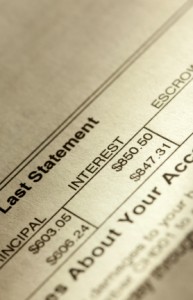How empowered are you when it comes to managing your finances? I’m not even talking about stock portfolios—just routine day-to-day stuff, like reading your bank statements. In this age of online banking, downloadable transactions, and software that balances your checkbook for you, it’s easy to let your banking run on autopilot. But if you don’t check your bank statements, you should.
I learned that lesson after I glanced at my mortgage statement one month. I typically add a little extra to each payment so I can whittle down the loan faster and save on interest. (Another good reason for taking charge of your finances—but that’s another story.) Usually any overpayment is assigned directly to principal, reducing my loan balance.
 But that’s not what happened this time. According to the statement, an extra $110.53 of my most recent payment was assigned to escrow—the funds the bank sets aside for property taxes and home insurance.
But that’s not what happened this time. According to the statement, an extra $110.53 of my most recent payment was assigned to escrow—the funds the bank sets aside for property taxes and home insurance.
I was surprised, to say the least. I hadn’t been told there was to be an increase in escrow. But I assumed there must be some reason for the change. After all, what do I know about mortgage amortization and escrow accounts? I shrugged it off, but made a mental note to check my statement again the next month.
Again, the same increase in escrow.
I called the bank to ask why this allocation that I did not understand had been made for the last two months. To my amazement, I was told that the bank had simply made an error in allocating my payment.
Had I let this error stand, I would have paid more interest on my mortgage than I should have—at least until the end of the year, when hopefully the surplus in the escrow account would have been noticed. (Or would it?)
So why am I telling you all this? Because this incident illustrates several important principles of generalism:
Value your own knowledge. The first time I noticed the discrepancy on my statement, I knew it wasn’t right. But I didn’t trust my own knowledge. I just assumed the bank employees knew what they were doing. After all, they’re the experts in money matters, right? Well, yes, but they’re also human and can make mistakes.
Take ownership. When the error occurred, no one at the bank noticed. To them, it was just one little blip in a sea of numbers. But it’s my home, my mortgage, and the payments come out of my budget. So it’s my responsibility, as the owner in this situation, to keep a close eye on what’s going on.
Become empowered. The second time I noticed the discrepancy, I empowered myself to do something about it. In other words, I picked up the phone and called the bank. Some people might not have bothered. Why deal with all that hassle just to save a few bucks on interest? You can decide for yourself, but here’s what I know: Wealthy people didn’t get that way by allowing someone else to make mistakes with their money.
Hold experts accountable. Although it’s my responsibility to take charge of my money, the bank also has a responsibility: to handle my funds properly and according to my wishes. Once I pointed out the error, I held the bank accountable for fixing it. The surplus from the escrow account was applied to the loan principal, reducing the balance and saving me interest.
Not reading your banks statements saves time. But allowing someone else to manage your money—especially an impersonal institution like a bank—can cost you. Is it worth it? Not in my book.
